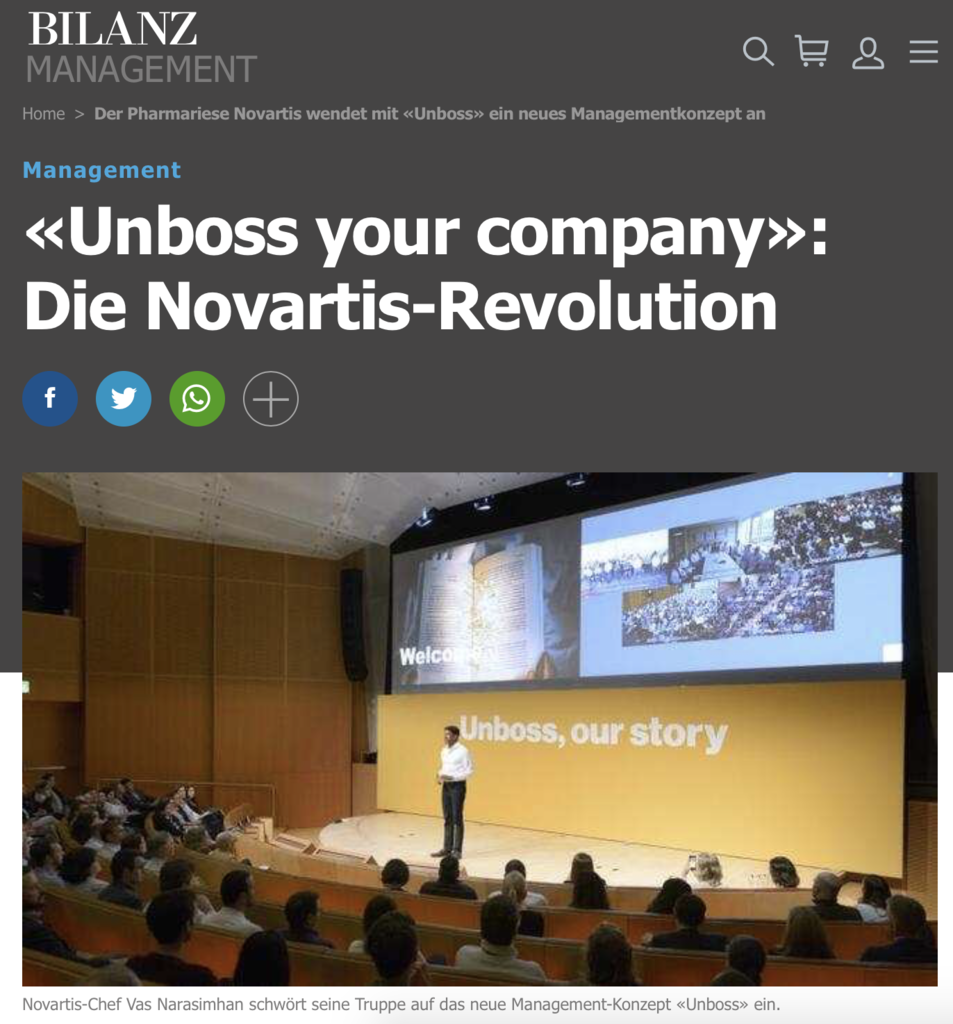Times of change are times of uncertainty. A typical reaction to this uncertainty is the call for heroes and strong leaders who bring order into chaos and show the way. On a societal and political level, we are therefore witnessing a strengthening of nationalist tendencies and the increasing popularity of politicians whose contribution consists essentially in unduly simplifying the complexity of the world by dividing it into black and white, good and wrong, us and them and other false dichotomies. In times of digital disruption, fear also increases in companies. And while in many places a strong leader is then desired, really strong leaders like Vas Narasimhan at Novartis do the opposite: “Unboss your Company!”

This headline from the German Manager Magazin following Harald Krüger’s announcement that he would no longer be available for a second term as Chairman of the Board of Management of BMW nicely illustrates this typical reaction. There is no doubt that the automotive industry is at the beginning of an unprecedented period of change. However, whether this requires an “alpha-male” I generally doubt (and refer to the Manifesto for Human(e) Leadership) and certainly I doubt it in this specific case. And actually Gerhard Wohland has already said everything about it:
As long as you need heroes or culprits to explain a situation convincingly, you haven’t understood it yet.
Gerhard Wohland
Egomaniacs at the Top Are Poison

With more than 100,000 employees, the Novartis pharmaceutical group is as large and global as BMW. And even in the pharmaceutical industry, which is still very comfortable, there is a lot of change underway. The current blockbuster model, in which a small number of blockbuster drugs represent the main source of income, is threatened by personalized medicine on the one hand and by the increasing sensitivity of the public and politicians to excessive drug prices on the other. In order to master this upheaval, Novartis is experiencing the greatest possible cultural shock with the 42-year-old Vas Narasimhan as CEO, who, like Satya Nadella at Microsoft, is the antithesis to the alpha male and acts more as a gardener than as a chess master.
Management theory only begins with Henry Ford 100 years ago, while the theory of the Servant Leader is already 2500 years old.
Vas Narasimhan (Bilanz)
Vas Narasimhan sees himself as an “eternal student in the field of leadership” (Bilanz). He is well aware that bosses who are successful in the long term have to take a step back and that egomaniacs at the top are therefore poison in his eyes. Instead, he consistently relies on radically rethinking the organization and thereby unleashing the untapped potential of the many employees. He does not only expect small gains in efficiency, but also quite immodest “breakthroughs that make 50 or 100 percent more performance possible” (Bilanz). With the book “Unboss” (Amazon Affiliate Link), which Jacob Bøtter and Lars Kolind published six years ago and which had received little attention until then, he found his guideline.
The Ten Principles of Unboss
The book by Jacob Bøtter and Lars Kolind, which is well worth reading, has been condensed at Novartis into these 10 principles (which are not explicitly listed in the book, but represent the essence of the individual chapters):
- Focus on purpose rather than profit.
- Dissolve the old hierarchy and encourage everyone to work together.
- Transform your business into an unlimited social network.
- Become a great place to work and attract the best people.
- Step aside and let your co-workers take the lead.
- Turn customers into partners and advocates for your cause.
- Get rid of rigid pay scales and bonus schemes – as well as selfish employees who care about such things.
- Involve people outside your company – also in research and development.
- Tolerate mistakes and talk openly about them.
- Strengthen dialogue throughout the organization through the use of social media.
Until this report on Novartis in the Swiss business magazine Bilanz, I had neither heard nor read about this book nor about “Unboss” in the broader sense. I therefore appreciate all the more that it reflects the theses of the Manifesto for Human(e) Leadership, which was written much later (2018).
This starts with the basic stance of seeing people as intrinsically motivated and not wanting to motivate them extrinsically through financial incentives (7.), which evidently does not work. The single theses of the Manifesto are sometimes very cleary recognizable like “purpose and trust over command and control” including the addition that profit is not an end in itself but the result of the right purpose. Others appear implicitly, such as “unleashing human potential over employing human resources”, which is crucial to be attractive as an employer (4.), and “diversity and dissent over conformity and consensus”, which in turn is crucial for an open dialogue (9. and 10.).
The call to step aside and let the co-workers take the lead (5.) is found in the manifesto as “growing leaders over leading followers”. And “courageously exploring the new over efficiently exploiting the known” naturally needs the learning culture demanded in 9. Especially present in the principles of Unboss is the tension between hierarchy and network with the tendency away from the hierarchy towards the social network, which is to be found in several points (2. and 3.) and even goes beyond the boundaries of the organization (6., 8. and 10.). Accordingly, this is also the core of Unboss:
Unboss thinking redefines the company as a social network or community with a purpose – in other words, a movement.
Jacob Bøtter und Lars Kolind: Unboss
The days of alpha male managers, as demanded by the Manager Magazine, are definitely over, but not everyone has noticed it so far (which, in the case of the Manager Magazine, may have something to do with the fact that they already bear part of the problem in their name). Satya Nadella has already proven at Microsoft the effectiveness of the antithesis to this outdated leadership model and I hope that Vas Narasimhan at Novartis will also succeed.





